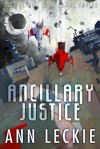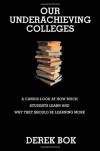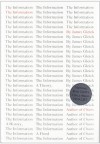Currently reading
McGlue
Knife Fight and Other Struggles
Far from the Tree: Parents, Children, and the Search for Identity
The Good Lord Bird
Ancillary Justice
Our Underachieving Colleges: A Candid Look at How Much Students Learn and Why They Should Be Learning More (New Edition)
Dissident Gardens
Nightmare Movies: Horror on Screen Since the 1960s
The Information: A History, a Theory, a Flood
Complete Novels
 When I wrote my review for China Mieville's The City and the City, I threw out a stray oblique threat to talk about how its central metaphor might say something about fiction. Mieville's conceit is a single physical space that is inhabited by two "separate" cities -- residents of the respective cities have deeply-ingrained habits of unseeing, so that walking through one neighborhood you might, if you violated practices both cultural and legally-mandated, turn your head and catch a glimpse of the space otherwise peopled, designed, lived. Such struck me as a sideways allegory for the way fiction and reality share the space of narrative. We tell a story, and with great care or simply deep unquestioned habit tell ourselves it's just a story, yet simply turn your head and the world peeks through. (And just as often our "world," those stones we kick so confidently, is shot through with our fictive shaping, which we habitually, willfully, perversely ignore.)
When I wrote my review for China Mieville's The City and the City, I threw out a stray oblique threat to talk about how its central metaphor might say something about fiction. Mieville's conceit is a single physical space that is inhabited by two "separate" cities -- residents of the respective cities have deeply-ingrained habits of unseeing, so that walking through one neighborhood you might, if you violated practices both cultural and legally-mandated, turn your head and catch a glimpse of the space otherwise peopled, designed, lived. Such struck me as a sideways allegory for the way fiction and reality share the space of narrative. We tell a story, and with great care or simply deep unquestioned habit tell ourselves it's just a story, yet simply turn your head and the world peeks through. (And just as often our "world," those stones we kick so confidently, is shot through with our fictive shaping, which we habitually, willfully, perversely ignore.)I ramble on here because that metaphor seems so peculiarly apt for my long history of reading Philip Roth. Every young writer probably grapples with (or was that an embrace?) the reviewers' desire to see the self in the fiction, to map the autobiography behind the first novel. Roth rather quickly made that exercise an exuberant central mythos: whether Alexander Portnoy or Nathan Zuckerman--or, most aggressively, as here, as "Philip Roth"--his protagonists and their narcissistic obsessions spit in the eye and rejected the unseeing, demanded a constant engagement at the borders between the cities. In this Plot, we get a memoir of the Newark Roths in the early '40s, and countless details echo earlier more explicit autobiographical works or hint with a madeleine-like particularity of lived experience. And yet these Roths watch the blond anti-semitic isolationist Adonis Charles Lindbergh capture the Republican nomination and send FDR packing, the novel turning to the counterfactual exploration of some other America, not our own.
Mieville's metaphor seems perfectly suited to the alternate history, too; explorations of what-happened-if (a Lindbergh presidency, a South victorious in the US Civil War, a Catholic Church never displaced from England), this genre has always delighted me when the premise is not mere window-dressing but the revelation of another city, just sideways of the one I (think I) know. The best alternate histories tease out the conditions of some other history, and in so doing tease out the conditionality of history: sometimes it's just an exercise about the want of a nail, but often (as with this, one of Roth's best) these fictions reveal the shaping of the world we take as simply there.
And what is a memoir but just such a case study? The last two decades' explosion of memoirs--not the extended-play reading of a life but the close interrogation of an event or events which have shaped who "I" am now--imagine a premise (often a trauma) which makes (or re-makes) the narrator's world the way it is. Oh, sure, they're not counterfactual. But in the Cities of narrative, one needn't unsee the way the borders are being drawn between what happened and what might have happened. In Plot, I feel confident asserting, we get as rich and realized a vision of how Philip Roth (as well as "Philip Roth") came to be.
And to be Jewish in America has been, as Roth's fiction over nearly five decades now has illustrated, to live just over the line in another City. When early on, before the Lindbergh ascension, Roth's father is offered a promotion to another neighborhood in Newark, the family journeys to this other place and sees another country. The book--whatever artifice we see in the central hook--is a precise detailing of what it's like to live in another country. (Stanley Crouch scolded Roth, or those embracing this book, for here presenting an "alternate history" when one needn't test-drive any counterfactual to narrate an America in the '40s with a whole race of people segregated, oppressed, living in fear... and he's both right and misguided. Given Roth's deep history at the intersections of world and word, I think it's a bit short-sighted to smack him for some allegedly simplistic approach to History and Nation.)
And here's where I come in, dancing at the borders. When I was in my early teens, I ordered Peter Straub's Ghost Story from the library but was accidentally sent Roths' The Ghost Writer. I didn't know what to make of it. Roth's alter ego Nathan Zuckerman only later emerged more forcefully and fully for me, but I was startled by the extended riff on a young woman who believed herself to be--and, in this riff, was made out to be--Anne Frank. This collision (of the enshrined martyr to History with a--blasphemous? bold, brutal, bleakly funny and horribly sad counter-history) blew me away, but I was unsure what sense, if any, to make of what was happening. So I went back to the library and grabbed Goodbye, Columbus... and in that novella and stories, and then in subsequent swallowing of much Roth, this young small-town happy-bland-American-Protestant-God-loving (-fearing?) good-boy smart kid, already feeling like an outsider (already losing, and fretfully seeking therefore to reaffirm and thus rejuvenate, his faith), found an alternate life that made so much sense of my own. Oh, not the cheap joke stuff (or not just): Portnoy wasn't me, nor any of his nicer or nastier protagonists. But there was something I understood about being the good boy and desiring to reject the good as well as to find it. I understood the empathy in the corrosive exploration of family and community and faith. I often say that Stephen King made me a reader, but Philip Roth made me a reader. King brought me into the City, and Roth showed me the Cities.
I haven't much talked about the novel. I think that it reinhabits longstanding obsessions for Roth, with a perhaps more implicit but still near-scabrous sense of play (Anne Frank still alive, Lindbergh now president) embedded in its careful delineation of a country that sidles into fear, hate, and aggression. (I suppose we could also turn our eyes a bit and glance at the way his faux '40s rests alongside the Patriot-Act America...) I could just lay out a case for what I love about the Roth sentences, about the escalation toward rant, about the beauty of the argument in his prose and in his characters. But I leave his defense for another time, some other review, some other reviewer.












